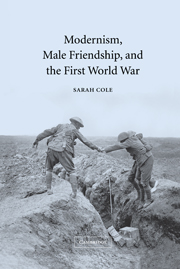Book contents
- Frontmatter
- Contents
- Acknowledgments
- Introduction
- 1 Victorian dreams, modern realities: Forster's classical imagination
- 2 Conradian alienation and imperial intimacy
- 3 “My killed friends are with me where I go”: friendship and comradeship at war
- 4 “The violence of the nightmare”: D. H. Lawrence and the aftermath of war
- Notes
- Index
2 - Conradian alienation and imperial intimacy
Published online by Cambridge University Press: 22 September 2009
- Frontmatter
- Contents
- Acknowledgments
- Introduction
- 1 Victorian dreams, modern realities: Forster's classical imagination
- 2 Conradian alienation and imperial intimacy
- 3 “My killed friends are with me where I go”: friendship and comradeship at war
- 4 “The violence of the nightmare”: D. H. Lawrence and the aftermath of war
- Notes
- Index
Summary
A Passage to India raised two broad questions: what does empire do to male friendship, and what can male friendship do for empire? In both cases, the text was skeptical, even worried – imperialism exposes basic drawbacks in the promise of male intimacy, and the power of friendship is seriously compromised by the even greater force of racial division. What develops is a sense of being stalled: friendship may have worked in some imagined past – or may work in some imagined future – as a structure to ground and mediate colonial relations, but the present is defined by a host of retreats, including the retreat from the safe spaces under friendship's umbrella. The idea that characters, perhaps history itself, have somehow been caught by the impasse of failed male fellowship is an arresting one in Forster's fictions, and provocative, too, for considering the earlier imperial moment epitomized by Joseph Conrad's tales. To recognize that the history of the British Empire is intertwined with institutions and conventions of male bonding provides an opening premise for an analysis of Conrad's texts, which thoroughly investigate the moral uncertainties surrounding not only imperialism, but the masculine relations that take shape in its troubled spaces. For Conrad, as for Forster, it is abundantly clear that male intimacy has always mattered in the British imperial project, and its fate in the waning nineteenth century preoccupies his work.
Of the major modernists in Britain, Conrad's reputation has perhaps shifted most dramatically over the last several decades.
- Type
- Chapter
- Information
- Modernism, Male Friendship, and the First World War , pp. 92 - 137Publisher: Cambridge University PressPrint publication year: 2003



